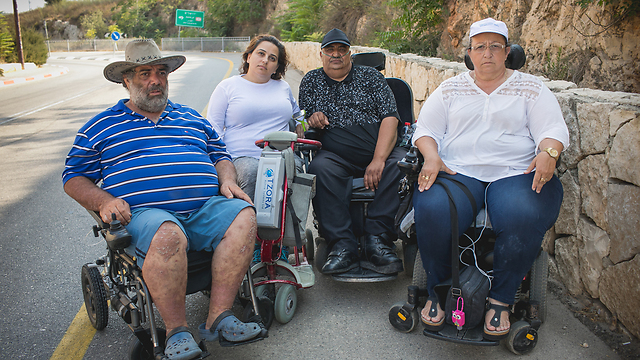
Netanyahu presents plan to increase disability benefits
People with disabilities will see their benefits go up twice in 2018: an increase of NIS 340 starting January and another NIS 161 starting July, at the cost of NIS 2 billion; an additional NIS 2.2 billion will be added in two stages by 2021; 'This is a historic move,' PM says.
The first stage of the plan, at the cost of NIS 1.4 billion, will go into effect retroactively from January 1, 2018.
The second stage, at the cost of NIS 600 million, was scheduled to go into effect in January 2019, but it has been brought forward to July 2018.
The remaining NIS 2.2 billion earmarked for the plan will go into effect in two additional stages by 2021.
The plan is due to be brought to the government for a vote on January 11 and then to the Knesset the next day.
"This is a historic move," Netanyahu said. "This means that in the coming year, disability benefits will increase by NIS 2 billion."
In the first stage of the plan, those eligible for general disability benefits will receive an additional NIS 340 every month, while those eligible for special services will receive an additional NIS 540. In the second stage, both general disability and special services benefits will be increased by an additional NIS 161 a month. Elderly people with disabilities will receive half the sum respectively, since they are also entitled to old age benefits.
Concurrently, NIS 50 million will be allocated to children's disability benefits and an additional NIS 50 million will be allocated to the blind and visually impaired.
"We talk a lot about leading a social policy, and it has no meaning without an economic policy. We're allocating some of the tax revenues to different populations," Netanyahu said.

"We are presenting an improved plan that includes the elderly and the blind," Welfare Minister Katz said. "This is a first step on the way to improving the disabled's situation. At the end of this journey, we need to reach minimum wage."
Shortly before the press conference, protesters from the "Disabled Panthers" group, who oppose the plan and the agreements reached with the government in September, blocked the northbound lanes of Highway 4 and burned tires.
The first stage of the plan was scheduled to go into effect on January 1, 2018, but the legislation to allow the increase in funds has yet to pass in the Knesset as the coalition decided to instead press for the Recommendations Law.
Disabled groups who support the agreement set an ultimatum to the government, threatening to resume their struggle and block roads if the agreement is not honored.
The head of the Struggle for the Disabled group, Naomi Moravia, welcomed the plan's implementation. "I'm sure it was not easy or simple to meet our high but just expectations, and indeed a high level of responsibility was required to reach the compromise that would allow both the increase of benefits and meeting the needs of the state budget," she said.
Alex Friedman, who led the disabled people's struggle and heads the "Disabled, Not Half a Person" group, was far more restrained in his reaction. "We welcome the fact the second stage was brought forward, but we have reservations over the fact the sum presented in the 'special announcement' from this morning was significantly lower than what had been agreed upon," he said.
"We don't excited by pretty yet empty gifts, and we insist on the principles of the agreement, which are: an addition of NIS 4.2 billion to disability benefits, enshrining all of the plan's stages into law, linking the benefits to the average wage, and encouraging people with disabilities to work by raising the disregard (the threshold before supplementary income for the disabled is cut) to NIS 5,300," Friedman added.
Dr. Amichai Tamir, one of the leaders of the disabled people's protest, said "the coalition of disabled organizations, as always, supports fully comparing disability benefits to minimum wage. As a result, the disabled's protest will continue."
"The agreement on which the bill proposal is based will leave disabled people below the poverty line, which currently stands at NIS 3,200, and this is why there is sweeping objection," Dr. Tamir added.
Meretz party leader MK Ilan Gilon, who sponsored the bill proposing to compare disability benefits to minimum wage, also expressed disappointment with the announcement.
"We've had enough with announcements, plans and press conferences—it's all just talk. After failing to meet their commitment to complete the legislative process by January 1, the government and the Treasury are continuing to violate and dissolve the compromise agreement we signed on the eve of Yom Kippur," Gilon said.
"Increasing disability benefits is righting a continuous wrong done to a quarter of a million Israeli citizens with disabilities. This increase should've happened a long time ago. Don't feign compassion and don't do us any favors, simply fulfill in full the agreement you signed," Gilon continued.
"Until the entire agreement is passed into law, with all of its clauses, I will consider the agreement violated and in the coming week promote my bill in spite of the government's opposition to it," he concluded.
 |


















